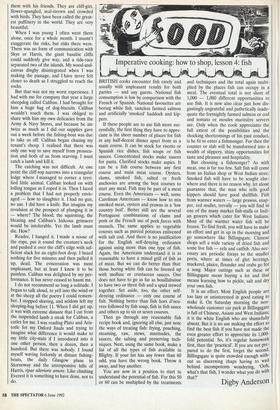Imperative cooking: how to shop, lesson 4: fish 1.40 0 LJORk. ) 0 41,...) 04 4.—) 4 UP 414 1..."...*—fikj
BRITISH cooks encounter fish rarely and usually with unpleasant results for both parties — and any guests. National fish consumption is low by comparison with the French or Spanish. National favourites are boring white fish, tasteless farmed salmon and artificially 'smoked' haddock and kip- pers.
If these people are to use fish more suc- cessfully, the first thing they have to appre- ciate is the sheer number of places for fish in any half-decent dinner apart from as a main course. It can be stock for risotto or Spanish rice dishes, fish soups or fish sauces. Concentrated stocks make sauces for pasta. Clarified stocks make aspics. It can be a fish course between any first course and main meat course. Oysters, clams, smoked fish, salted or fresh anchovies are among the best courses to start any meal. Fish may be part of a meat course. Even the Americans — well, some Carolinan Americans — know how to mix smoked meat, oysters and prawns in a low country boil'. Better still are the several Portuguese combinations of clams and pork or the French use of pork farces with mussels. The same applies to vegetable courses such as puréed potatoes enlivened with salt cod. And there is no justification for the English self-denying ordinance against using more than one type of fish. Again, the Americans understand it is as reasonable to have a mixed grill of fish as of meat. But we can do better than that: those boring white fish can be livened up with mollusc or crustacean sauces. One does not have to go as far as bouillabaisse to have two or three fish and a spud stewed together. Set aside, too, the other self- denying ordinance — only one course of fish. Nothing better than fish hors d'oeu- vres followed by fish soup, fish in fish sauce and others up to six or seven courses.
Then go through any reasonable fish recipe book and, ignoring all else, just note the ways of treating fish: frying, poaching, steaming, raw, stews, marinades, the sauces, the salting and preserving tech- niques. Next, using the same book, make a list of all the types of fish available in Blighty. If your list has any fewer than 60 odd, you have the wrong book. Throw it away, and buy another.
You are now in a position to start to understand the potential of fish. For this 50 or 60 can be multiplied by the treatments
and techniques and the total again multi- plied by the places fish can occupy in a meal. The eventual total is not short of 1,000 — 1,000 different opportunities to use fish. It is now also clear just how dis- gustingly ungrateful and pathetically inade- quate the fortnightly fanned salmon or cod and tomato or moules mariniere servers are. Only when the cook appreciates the full extent of the possibilities and the shocking shortcomings of his past conduct, is he fit to enter a fishmonger. For then the counter or slab will be transformed into a wealth of slippery, shiny opportunities for taste and pleasure and hospitality.
But choosing a fishmonger? As with meat, one is far too few. Salt fish will come from an Italian shop or West Indian store. Smoked fish will have to be sought else- where and there is no reason why, let alone guarantee that, the man who sells good kippers should have good shellfish. Fish from warmer waters — large prawns, snap- per, red mullet, trevally — you will find in one of the many market fish-stalls or Indi- an grocers which cater for West Indians. Most of the warmer water fish will be frozen. To find fresh, you will have to make an effort and get in up in the morning and go somewhere like Billingsgate. Chinese shops sell a wide variety of dried fish and some live fish — eels and catfish. Also nec- essary are periodic forays to the smaller ports, where at times of glut herrings, mackerel, plaice, flounder and crabs go for a song. Major outings such as these or Billingsgate mean buying a lot and that means learning how to pickle, salt and dry your own fish.
It is an effort. Most English people are too lazy or uninterested in good eating to make it. On Saturday morning the non- wholesale customer car park at Billingsgate is full of Chinese, Asians and West Indians; it is the white English who are shamefully absent. But it is no use making the effort to find the best fish if you have not made the even greater effort to appreciate its 1,000- fold potential. So, it's regular homework first, then the 'practical'. If you are not pre- pared to do the first, forget the second. Billingsgate is quite crowded enough with- out us discerning chaps having to wait behind incompetents wondering, `Ooh, what's that fish, I wonder what you do with that?'
Digby Anderson


































































 Previous page
Previous page